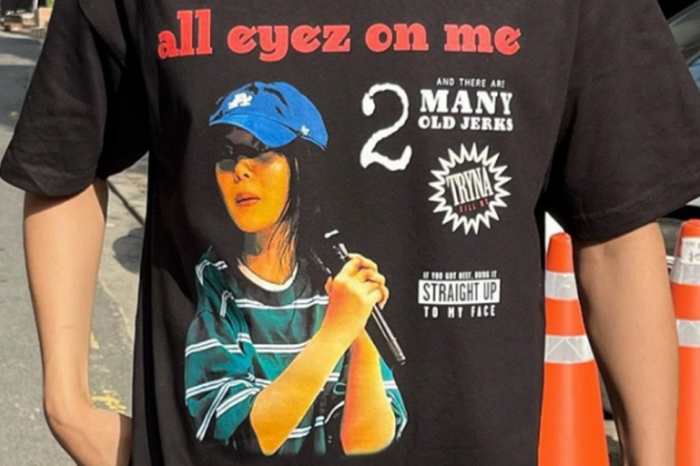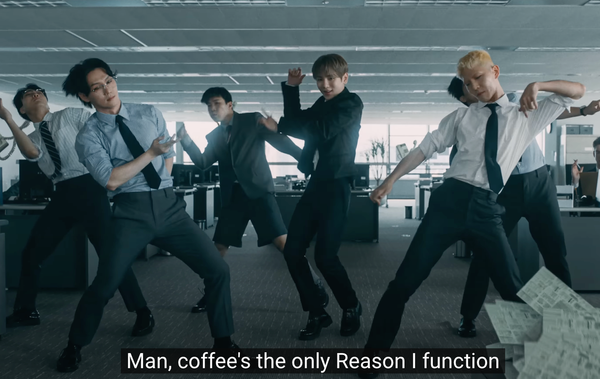Why are K-pop stars singing children's songs?
What do NCT 127’s Cherry Bomb, NMIXX’s Young, Dumb, Stupid, NewJeans’ Zero, EXO’s Kokobop all have in common? Aside from being pretty great songs, they all reference nursery rhymes and/or hand games.
They’re far from the only K-pop songs that reference nursery rhymes, which begs the question… why?
Some of them, like Cherry Bomb’s “If you are happy and you know it, clap your hands yo (in this beat)” and EXO’s Ko Ko Bop’s opening verse”Shimmie shimmie Ko Ko Bop” overtly reference the childhood chant lyrically.
Others others pull on melodies, like Young, Dumb, Stupid’s incorporation of the tune of Frère Jacques, and Zero referencing the childhood rhyme game that in English as “Eenie Meenie Miney Mo“ but in Korea actually references Coca Cola directly, making it a perfect foil for the song, which is a Coke Zero promotional tie-in.
The topic of nursery rhymes, and just childhood in general, in K-pop has been something I’ve been eager to talk about has been on my mind for ages. The way that producers and songwriters capture those melodic memories and modernize them is fascinating, but for a variety of reasons the bigger reported piece I wanted to write about all this always fell through and I sort of just dropped it.
At least, I did until I was reminded of this topic when I was recently listening to the Pop Pantheon’s episode “JA RULE, NELLY, LUDACRIS & 50 CENT (with Jordan Sargent),” released originally in March.
While talking about Nelly’s Grammy-winning 2000 Country Grammar (Hot Shit), I was once again reminded of EXO’s song, given that Nelly famously referenced the popular childhood “shimmy shimmy cocoa what” chant, which in turn was made famous in popular music originally by Little Anthony & The Imperials 1950’s hit "Shimmy Shimmy Ko Ko Bop.” When that song came out, the song game, which is typically known as “Down Down Baby” was already popularized among young Black girls in the US, according to ethnomusicologist Krya Gaunt, author of The Games Black Girls Play Learning the Ropes from Double-Dutch to Hip-Hop.
In a TED.com video, Gaunt gave a bite-sized explainer of how songs sung by young Black girls while playing double-dutch jump rope have historically been a form of empowerment, a sport that they excel at with its own culture. "Girls would rule the playground. They'd make sure boys weren't part of that. It's their space, it's a girl power space, it's where girls get to shine... Boys overheard those [rhymes], which is why I think so many hip-hop artists sampled from things they heard from Black girl game songs." Gaunt suggests that Nelly’s song was an immediate hit because of how many people would obviously resonate to the way Down Down Baby was incorporated, which is probably why we still see this sort of integration frequently in K-pop songs.
There’s a lot to be said about K-pop’s (and all modern pop music’s) relationship to hip-hop and Black American music and culture in general, but that’s a greater conversation that is beyond the scope of this week’s edition. However, Gaunt’s point remains, that by tying a song to a already-known melody or rhyme, associated with positive moments of childhood, you get a made-ready earworm. Which is probably why three major definitive hits I just referenced all featured the immensly accessible Down Down Baby.
K-pop hits typically, though not always, are earworms. Those songs that you can’t stop humming, even if you didn’t think you really were actively listening to it. Those catchy songs are driven by hook choruses, and the point hook is to grasp your attention and maybe get stuck in your head for all day, all year, or simply forever. That’s just how brains work.
Recalling childhood tunes, or just general references to youthful memories, is a perfect tool to drive K-pop hooks and inspire songs in general.
Not all of these songs are familiar to all listeners, but the flow of childhood rhymes are something universal, with them being some of the first melodies we as humans typically become familiar with. HyunA’s Red is a great example: it’s a song inspired by a popular Korean kids rhyme, and even though HyunA is a popular K-pop icon globally she, and most female artists tend to get huge hits in Korea rather than overseas. A song pegged around a childhood rhyme created by one of the biggest divas of the era? That just was a match made in heaven.
There’s power in this sort of musical memory device. K-pop as an industry is very good at finding sonic moments that move people and create hits that are bigger than the ~3 minutes they exist for, so drawing on all of this simply makes sense, and is likely why it’s such a recurring theme.
Have any thoughts? Leave them below!
What I’m working on
For Teen Vogue, I spoke with Odd Eye Circle, the LOONA/ARTMS team, about what it’s like coming back to their OEC days after everything that’s gone on. It’s a sensitive story, and legal disputes are still going on so somethings were off the table to talk about, but I feel pretty proud about my turn of phrase in this piece, and really enjoyed the conversation in general.
Here’s to hoping for more great stuff from the (former? Unclear!) LOONA ladies. Thank goodness they’re still going to remain active, because we all need their memery.
What I’m listening to
I honestly wanted to just keep embedding videos up above, but that felt rude so I want to take this space to highlight the immensely wonderful remix of NewJeans’ Zero with J.I.D. This new take on the original version really feels somehow even more NewJeans to me, a little more refined and less jerky than the earlier alternative.
I didn’t watch Boys Planet 999, because I’ve been burned by Mnet reality shows too many times to count to invest so much time and energy into. But Zerobaseone’s debut didn’t disappoint, with a captivating single in the form of In Bloom. I think it’s easy to refer to Wanna One’s Energetic when listening to it (Wanna One came out of Boys Planet precursor Produce 101), but takes a different, a bit more relaxed somehow. It’s not necessarily a slow, laidback song, but there’s something about it that feels like it should be played at a pretty chill pool party.
What I’m reading
I went out amid a storm yesterday to go pick up my copy of Beyond the Story: 10 Year Record of BTS autobiography, co-written by Kang Myeongseok and BTS, and translated into English by Anton Hur, Clare Richards, and Slin Jung. Having written my own book on BTS, 2020’s BTS: Blood, Sweat, & Tears from an outside perspective, it’s really a pleasure to sit down and hear BTS tell their own view of things.
I’m only two chapters in at the moment but hope to finish reading this week. So far, I’m very intrigued by the story of BTS as it’s being told, and it’s very exciting to see where the narratives collide and clash. Both are texts based in journalism as that’s where both I and Kang work professionally, but Beyond the Scene features BTS’s own voices and is Hybe-rubber-stamped versus the more traditional music bio that is Blood, Sweat, & Tears, so it’s interesting to see where perspectives diverged on how to talk about certain things.
Writing a book is one of the most intense, emotional experiences I ever had, and I still sometimes wake up with a nightmare of some thought I didn’t include or typos. So far, my biggest nightmare with the book, aside from people who don’t care for my work not giving it a chance, was that the Japanese edition had to be reprinted right after it was published because someone had somehow changed the names of the members, written in Korean, to, well, not their names. Luckily, reprints were easy enough for that, and now I have two editions of one foreign translation sitting on my shelf, which is pretty cool!
This is the long way of saying that there’s a typo in the first few pages of the BTS book, and when I got to it, I really felt like… “Wow. Even if a book as tightly edited and seen by as many people as Beyond the Story certainly was can have a typo (it seems like an autocorrect nobody caught in the final proof, probably happened during typesetting) then how can the rest of us strive for perfection?” Perfection is for deities; us mere mortals can make our mistakes and errors and still be doing something great. It was like a little bit of tacit permission to feel just okay with things sometimes, so thanks for that BTS. (I imagine a new print is probably being ordered as we speak.)
If you want to read Beyond the Story, I hope you order it from Yu and Me in NYC via bookshop.org’s website. A Chinatown institution, a fire in their building recently shut down the storefront and they’re fundraising to support itself and staff ahead of the arrival of insurance money, and around a year-long renovation.
If you want to read BTS: Blood, Sweat & Tears, it’s currently backordered at bookshop.org but available still at other retailers, so you can ask your local bookstore or library to request it. Also, I have a handful of German and Japanese copies I’d like to unload to people who will appreciate them, so if you or anyone you know may want to read and/or use them for academic usage, please have them email me to discuss the best way to get them to you. I’m all out of English copies at the moment, but if you’d like to read the book or excerpts and can’t get your hand on a copy, similarly email me and we can try to work something out. I know it’s not the cheapest, but a lot of love, and sweat and tears, and glossy high-quality photo and art, went into making BTS: BST so I hope people can be understanding.
What I’m watching
On the Kdrama front, I just started See You in My 19th Life. I kind of have felt 2023’s softer Kdramas are lacking a little bit, to be honest, but it’s nice enough, and the acting is very good. I loved Ahn Bo-hyun in Yumi’s Cells, so excited to see him in the lead here.
Joy Ride is so fun, so if you have a chance to watch this humorous friendship and soul searching Asian American-fronted film you definitely should. There’s a big K-pop number you must watch as a reader of this newsletter, but more than that I think the way the film handles K-pop is very telling, and honestly very emotional at times, like one character traveling to China from the US explicitly to meet their online friends who admits they love K-pop because K-pop loves them back.
The film also acknowledges K-pop’s long roots in hip-hop, albeit briefly, and I thought that was really a great tiny addition to the script.



